Why did the Apostles
stand up to the Jewish leaders and risk death to announce Jesus Christ?
Index
Who was / is this Jesus?
Comment
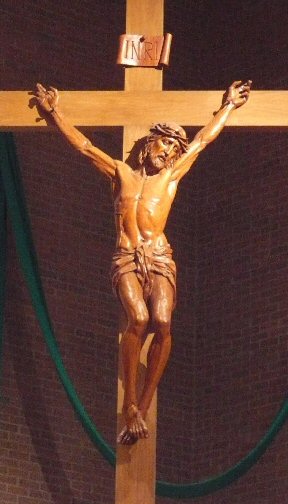 Jesus did not come to
rule over a kingdom in any earthly-political sense; His mission was to conquer
sin and Satan, and this end He could achieve only by suffering and dying.
Much education was needed before the apostles grasped this. However, after
the resurrection of their Master and the descent of the Holy Spirit, they stood
up fearlessly and preached Christ crucified. They withstood the temple
officials who forbade them to teach.
Jesus did not come to
rule over a kingdom in any earthly-political sense; His mission was to conquer
sin and Satan, and this end He could achieve only by suffering and dying.
Much education was needed before the apostles grasped this. However, after
the resurrection of their Master and the descent of the Holy Spirit, they stood
up fearlessly and preached Christ crucified. They withstood the temple
officials who forbade them to teach.
"What are we to do
with these men? Everyone living in Jerusalem knows that a remarkable sign
was done through them, and we cannot deny it. But so that it may not be
spread any further among the people, let us give them a stern warning never
again to speak to anyone in this name."
(Acts 4:16-17)
So they called them
back and ordered them not to speak or teach at all in the name of Jesus.
Peter and John, however, said to them in reply, "Whether it is right in the
sight of God for us to obey you rather than God, you be the judges. It is
impossible for us not to speak about what we have seen and heard."
(Acts 4:18-20)
After recalling the
apostles, they had them flogged, ordered them to stop speaking in the name of
Jesus, and dismissed them. So they left the presence of the Sanhedrin,
rejoicing that they had been found worthy to suffer dishonor for the sake of the
name.
(Acts 5:40-41)
It
had finally become clear that the kingdom of God upon earth does not consist in
ease and glory but in suffering and sacrifice.
The King of the Jews
died upon a Cross. To Him who arose from the dead all power was given in heaven
and upon earth.
To know this Christ, to accept the Church He
founded, and to understand that the Holy Spirit guides it in matters of faith and
morals, we must examine these six statements.
Top
Index
I Did Jesus
Really Exist
It is also important to recognize that in A.D. 70, the Romans invaded and
destroyed Jerusalem and most of Israel, slaughtering its inhabitants.
Entire cities were literally burned to the ground. We should not be
surprised, then, if much evidence of Jesus' existence was destroyed. Many
of the eyewitnesses of Jesus would have been killed. These facts likely
limited the amount of surviving eyewitness testimony of Jesus.
Considering that Jesus' ministry was largely confined to a relatively
unimportant area in a small corner of the Roman Empire, a surprising amount of
information about Jesus can be drawn from secular historical sources. Some
of the more important historical evidences of Jesus include the following:
The first-century Roman Tacitus, who is considered one
of the more accurate historians of the ancient world, mentioned superstitious
"Christians" (from Christus, which is Latin for Christ), who suffered under
Pontius Pilate during the reign of Tiberius. Suetonius, chief secretary to
Emperor Hadrian, wrote that there was a man named Chrestus (or Christ) who lived
during the first century (Annais 15.44).
Flavius Josephus is the most famous Jewish historian. In his
Antiquities he refers to James, "the brother of Jesus, who was called
Christ." There is a controversial verse (18:3) that says, "Now there was
about this time Jesus, a wise man, if it be lawful to call him a man. For
he was one who wrought surprising feats. . . . He was (the) Christ. . . he
appeared to them alive again the third day, as the divine prophets had foretold
these and ten thousand other wonderful things concerning him" One version
reads, "At this time there was a wise man named Jesus. His conduct
was good and (he) was known to be virtuous. And many people from among the
Jews and the other nations became his disciples. Pilate condemned him to
be crucified and to die. But those who became his disciples did not
abandon his discipleship. They reported that he had
appeared to them three
days after his crucifixion, and that he was alive; accordingly he was perhaps
the Messiah, concerning whom the prophets have recounted wonders."
Julius Africanus quotes the historian Thallus in a discussion of the darkness
which followed the crucifixion of Christ (Extant Writings, 18).
Pliny the Younger, in Letters 10:96, recorded early Christian worship practices
including the fact that Christians worshiped Jesus as God and were very
ethical, and he includes a reference to the love feast and Lord's Supper.
The Babylonian Talmud (Sanhedrin 43a) confirms Jesus' crucifixion on the eve of
Passover and the accusations against Christ of practicing sorcery and
encouraging Jewish apostasy.
Lucian of Samosata was a second-century Greek writer who admits that Jesus was
worshiped by Christians, introduced new teachings, and was crucified for them.
He said that Jesus' teaching included the brotherhood of believers, the
importance of conversion, and the importance of denying other gods.
Christians lived according to Jesus' laws, believed themselves to be immortal,
and were characterized by contempt for death, voluntary self-devotion, and
renunciation of material goods.
Mara Bar-Serapion confirms that Jesus was thought to be a wise and virtuous man,
was considered by many to be the king of Israel, was put to death by the Jews,
and lived on in the teachings of His followers.
Then we have all the Gnostic writings (The Gospel of Truth, The Apocryphon of
John,
the Gospel of Thomas, the Treatise on Resurrection, etc.) that all mention
Jesus.
In fact, we can almost reconstruct the gospel just from early non-Christian
sources:
Jesus was called the Christ (Josephus), did "magic," led Israel into new
teachings, and was hanged on Passover for them (Bbvionian Talmud) in Judea (Tacitus).
but claimed to be God and would return (Eliezar), which his followers believed,
worshipping Him as God (Pliny the Younger).
There is overwhelming evidence for the existence of Jesus Christ, both in
secular and biblical history. Perhaps the greatest evidence that Jesus did
exist is the fact that literally thousands of Christians in the first century
A.D., including the twelve apostles, were willing to give their lives as martyrs
for Jesus Christ. People will die for what they believe to be true, but no
one will die for what they know to be a lie.
(https://en.wikipedia.org/Did_Jesus_Exist%3F_(Ehman)
Top
Index
II Jesus claimed to be divine;
for which He was condemned
to die.
Gospel Writers chapter and verse
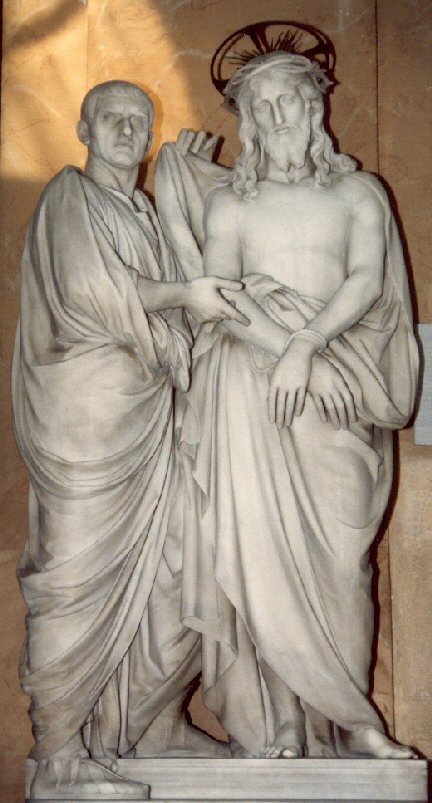 But Jesus remained silent. The high priest then said to
him: “I order you to tell us under oath before the living God whether you are
the Messiah, the Son of God.” Jesus answered: “It is you who say it. But I
tell you this: Soon you will see the Son of Man seated at the right hand of the
Power and coming on the clouds of heaven.” “At this the high priest tore his
robes: “He has blasphemed! What further need have we of witnesses? Remember,
you heard the blasphemy. What is your verdict?” They answered, “He deserves
death!”
(Matthew 26:63-66)
But Jesus remained silent. The high priest then said to
him: “I order you to tell us under oath before the living God whether you are
the Messiah, the Son of God.” Jesus answered: “It is you who say it. But I
tell you this: Soon you will see the Son of Man seated at the right hand of the
Power and coming on the clouds of heaven.” “At this the high priest tore his
robes: “He has blasphemed! What further need have we of witnesses? Remember,
you heard the blasphemy. What is your verdict?” They answered, “He deserves
death!”
(Matthew 26:63-66)
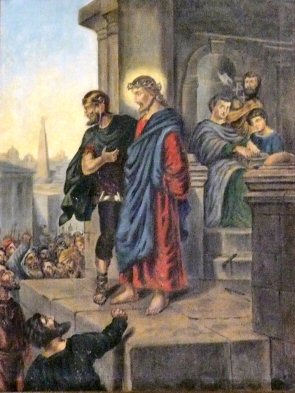 But Jesus remained silent; he made no reply. Once again
the high priest interrogated him: “Are you the Messiah, the Son of the Blessed
One?” Then Jesus answered: “I am; and you will see the Son of Man seated at the
right hand of the Power and coming with the clouds of heaven.” At that the high
priest tore his robes and said: “What further need do we have of witnesses? You
have heard the blasphemy. What is your verdict?” They all concurred in the
verdict. “Guilty,” with its sentence of death.
(Mark 4:61-64)
But Jesus remained silent; he made no reply. Once again
the high priest interrogated him: “Are you the Messiah, the Son of the Blessed
One?” Then Jesus answered: “I am; and you will see the Son of Man seated at the
right hand of the Power and coming with the clouds of heaven.” At that the high
priest tore his robes and said: “What further need do we have of witnesses? You
have heard the blasphemy. What is your verdict?” They all concurred in the
verdict. “Guilty,” with its sentence of death.
(Mark 4:61-64)
At daybreak, the elders of the people, the chief priests and the scribes
assembled again. Once they had brought him before their council, they
said, “Tell us, are you the Messiah?” He replied, “If I tell you, you will
not believe me, and if I question you, you will not answer. This much only
will I say: ‘From now on, the Son of Man will have his seat at the right hand of
the Power of God,’” “So you are the Son of God?” they asked in
chorus. He answered, “It is you who say I am.” They said, “What need
have we of witnesses? We have heard it from his own mouth.”
(Luke 22:66-71)
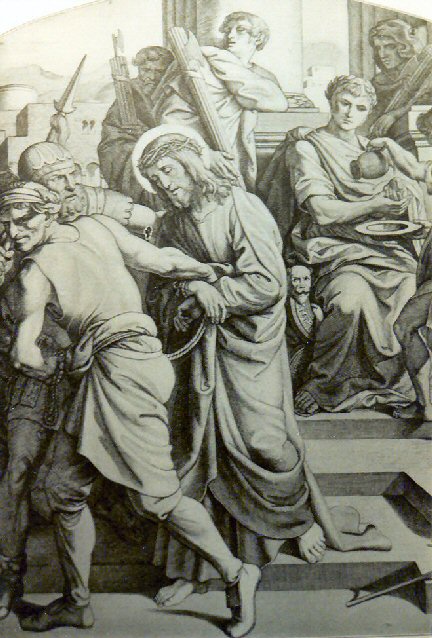 Pilate went back into the praetorium
and summoned Jesus. “Are you the King of the Jews?” he asked him.
Jesus answered, “Are you saying this on your own, or have others been telling
you about me?” I am no Jew!” Pilate retorted, “It is your own people
and the chief priests who have handed you over to me. What have you done?”
Jesus answered; “My kingdom does not belong to this world. If my kingdom
were of this world, my subjects would be fighting to save me from being handed
over to the Jews. As it is, my kingdom is not here.” At this Pilate
said to him, “So, then, you are a king?” Jesus replied: “It is you who say
I am a king. The reason I was born, the reason why I came into the world,
is to testify to the truth. Anyone committed to the truth hears my voice.”
(John 18:33-37)
Pilate went back into the praetorium
and summoned Jesus. “Are you the King of the Jews?” he asked him.
Jesus answered, “Are you saying this on your own, or have others been telling
you about me?” I am no Jew!” Pilate retorted, “It is your own people
and the chief priests who have handed you over to me. What have you done?”
Jesus answered; “My kingdom does not belong to this world. If my kingdom
were of this world, my subjects would be fighting to save me from being handed
over to the Jews. As it is, my kingdom is not here.” At this Pilate
said to him, “So, then, you are a king?” Jesus replied: “It is you who say
I am a king. The reason I was born, the reason why I came into the world,
is to testify to the truth. Anyone committed to the truth hears my voice.”
(John 18:33-37)
It was preparation day for Passover, and it was about noon. And he said to
the Jews, "Behold, your king!" They cried out, "Take him away, take him
away! Crucify him!" Pilate said to them, "Shall I crucify your
king?" The chief priests answered, "We have no king but Caesar."
Then he handed him over to them to be crucified." (Jn 19:14-16)
Top
Index
III Jesus
proved he was divine.
Raised Lazarus from the dead
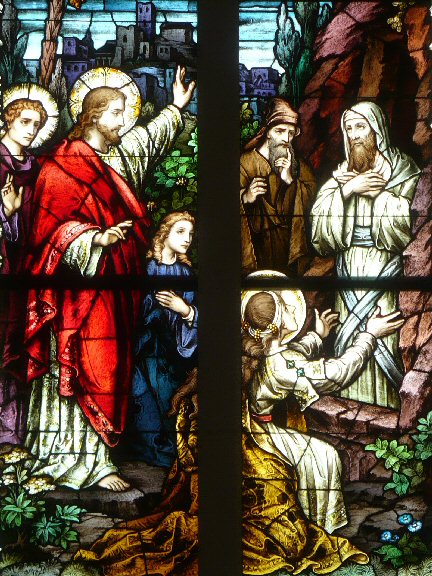 So Jesus, perturbed again, came to the tomb. It was a cave, and a stone
lay across it. Jesus said, "Take away the stone." Martha, the dead
man's sister, said to him, "Lord, by now there will be a stench; be has been
dead for four days." Jesus said to her, "Did I not tell you that if you
believe you will see the glory of God?" So they took away the stone.
And Jesus raised his eyes and said, "Father, I thank you for hearing me.
I know that you always hear me; but because of the crowd here I have said this,
that they may believe that you sent me." And when he had said this, he
cried out in a aloud voice, "Lazarus, come out!" The dead man came out,
tied hand and foot with burial bands, and his face was wrapped in a cloth.
So Jesus said to them, "Untie him and let him go." (John 11:38-44)
So Jesus, perturbed again, came to the tomb. It was a cave, and a stone
lay across it. Jesus said, "Take away the stone." Martha, the dead
man's sister, said to him, "Lord, by now there will be a stench; be has been
dead for four days." Jesus said to her, "Did I not tell you that if you
believe you will see the glory of God?" So they took away the stone.
And Jesus raised his eyes and said, "Father, I thank you for hearing me.
I know that you always hear me; but because of the crowd here I have said this,
that they may believe that you sent me." And when he had said this, he
cried out in a aloud voice, "Lazarus, come out!" The dead man came out,
tied hand and foot with burial bands, and his face was wrapped in a cloth.
So Jesus said to them, "Untie him and let him go." (John 11:38-44)
Cured the leper
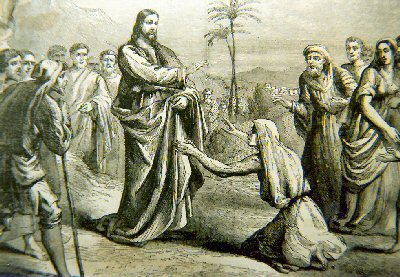 Suddenly a leper came forward and did him homage, saying to him, “Sir, if you will
to do so, you can cure me. Jesus stretched out his hand and touched him and
said, “I do will it. Be cured.” Immediately the man’s leprosy disappeared.
Suddenly a leper came forward and did him homage, saying to him, “Sir, if you will
to do so, you can cure me. Jesus stretched out his hand and touched him and
said, “I do will it. Be cured.” Immediately the man’s leprosy disappeared.
(Matthew 8:2-3)
Girl brought back to life
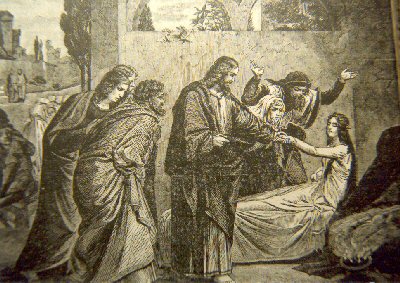 Before Jesus had finished speaking to them, a synagogue leader came up, did him
reverence, and said: “My daughter has just died. Please come and lay your hand
on her and she will come back to life.”
Before Jesus had finished speaking to them, a synagogue leader came up, did him
reverence, and said: “My daughter has just died. Please come and lay your hand
on her and she will come back to life.”
When Jesus arrived at the synagogue leaders’ house and saw the flute players and
the crowd who were making a din, he said, “Leave, all of you! The little girl
is not dead. She is asleep.” At this they began to ridicule him. When the
crowd had been put out he entered and took her by the hand, and the little girl
got up. News of this circulated throughout the district. (Matthew
9:18-19, 23-25)
Cured Blind
Bartimaeus
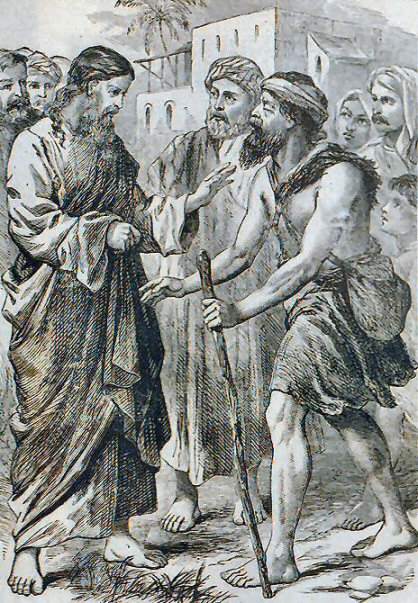 They
came to Jericho. And as he was leaving Jericho with his disciples and a
sizable crowd, Bartimaeus, a blind man, the son of Timaeus, sat by the roadside
begging. On hearing that it was Jesus of Nazareth, he began to cry out and
say, "Jesus, son of David, have pity on me. And many rebuked him, telling
him to be silent. But he kept calling out all the more, "Son of David,
have pity on me." Jesus stopped and said, "Call him." So they called
the blind man, saying to him, "Take courage; get up, he is calling you."
He threw aside his cloak, sprang up, and came to Jesus. Jesus said to him
in reply, "What do you want me to do for you?" The blind man replied to
him, "Master, I want to see." Jesus told him, "Go your way, your faith has
saved you." Immediately he received his sight and followed him on the way.
(Mark 10:46-52)
They
came to Jericho. And as he was leaving Jericho with his disciples and a
sizable crowd, Bartimaeus, a blind man, the son of Timaeus, sat by the roadside
begging. On hearing that it was Jesus of Nazareth, he began to cry out and
say, "Jesus, son of David, have pity on me. And many rebuked him, telling
him to be silent. But he kept calling out all the more, "Son of David,
have pity on me." Jesus stopped and said, "Call him." So they called
the blind man, saying to him, "Take courage; get up, he is calling you."
He threw aside his cloak, sprang up, and came to Jesus. Jesus said to him
in reply, "What do you want me to do for you?" The blind man replied to
him, "Master, I want to see." Jesus told him, "Go your way, your faith has
saved you." Immediately he received his sight and followed him on the way.
(Mark 10:46-52)
Raised
the Widow's Son
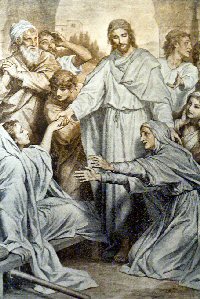 Soon
afterward he journeyed to a city called Nain, and his disciples and a large
crowd accompanied him. As he drew near to the gate of the city, a man who
had died was being carried out, the only son of his mother, and she was a widow.
A large crowd from the city was with her. when the Lord saw her, he was
moved with pity for her and said to her, "Do not weep." He stepped forward
and touched the coffin, at this the bearers halted, and he said, "Young man, I
tell you arise!" The dead man sat up and began to speak, and Jesus gave
him to his mother. Fear seized them all, and they glorified God,
exclaiming, "A great prophet has arisen in our midst," and "God has visited his
people." This report about him spread through the whole of Judea and in
all the surrounding region.
(Luke 7:11-17)
Soon
afterward he journeyed to a city called Nain, and his disciples and a large
crowd accompanied him. As he drew near to the gate of the city, a man who
had died was being carried out, the only son of his mother, and she was a widow.
A large crowd from the city was with her. when the Lord saw her, he was
moved with pity for her and said to her, "Do not weep." He stepped forward
and touched the coffin, at this the bearers halted, and he said, "Young man, I
tell you arise!" The dead man sat up and began to speak, and Jesus gave
him to his mother. Fear seized them all, and they glorified God,
exclaiming, "A great prophet has arisen in our midst," and "God has visited his
people." This report about him spread through the whole of Judea and in
all the surrounding region.
(Luke 7:11-17)
Cured the Paralyzed Man
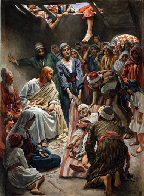 One day as Jesus was
teaching, Pharisees and teachers of the law were sitting there who had come from
every village of Galilee and Judea and Jerusalem, and the power of the Lord was
with him for healing. And some men bought on a stretcher a man who was
paralyzed; they were trying to bring him in and set (him) in his presence.
But not finding a way to bring him in because of the crowd, they went up on the
roof and lowered him on the stretcher through the tiles into the middle in front
of Jesus. When he saw their faith, he said, "As for you, your sins are
forgiven." Then the scribes and Pharisees began to ask themselves, "Who is
this who speaks blasphemies? Who but God alone can forgive sins?"
Jesus knew their thoughts and said to them in reply, "What are you thinking in
your hearts? Which is easier, to say, 'Your sins are forgiven,' or to say,
'Rise and walk!" But that you may know that the Son of Man has authority
on earth to forgive sins" - he said to the man who was paralyzed, "I say to you,
rise, pick up your stretcher, and go home." He stood up immediately before
them, picked up what he had been lying on, and went home, glorifying God.
Then astonishment seized them all and they glorified God, and, struck with awe,
they said, "We have seen incredible things today." (Luke 5:17-26)
One day as Jesus was
teaching, Pharisees and teachers of the law were sitting there who had come from
every village of Galilee and Judea and Jerusalem, and the power of the Lord was
with him for healing. And some men bought on a stretcher a man who was
paralyzed; they were trying to bring him in and set (him) in his presence.
But not finding a way to bring him in because of the crowd, they went up on the
roof and lowered him on the stretcher through the tiles into the middle in front
of Jesus. When he saw their faith, he said, "As for you, your sins are
forgiven." Then the scribes and Pharisees began to ask themselves, "Who is
this who speaks blasphemies? Who but God alone can forgive sins?"
Jesus knew their thoughts and said to them in reply, "What are you thinking in
your hearts? Which is easier, to say, 'Your sins are forgiven,' or to say,
'Rise and walk!" But that you may know that the Son of Man has authority
on earth to forgive sins" - he said to the man who was paralyzed, "I say to you,
rise, pick up your stretcher, and go home." He stood up immediately before
them, picked up what he had been lying on, and went home, glorifying God.
Then astonishment seized them all and they glorified God, and, struck with awe,
they said, "We have seen incredible things today." (Luke 5:17-26)
Top
Index
Rose from the Dead
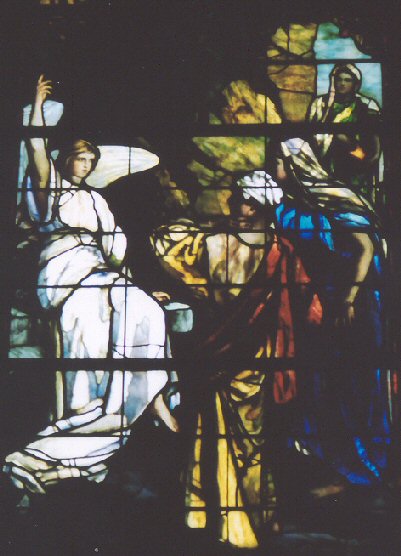 After the Sabbath, as the first
day of the week was dawning, Mary Magdalene and the other Mary came to see the
tomb. And behold, there was a great earthquake; for an angel of the Lord
descended from heaven, approached, rolled back the stone, and sat upon it.
His appearance was like lightning and his clothing was white as snow. The
guards were shaken with fear of him and became like dead men. Then the
angel said to the women in reply, "Do not be afraid! I know that you are
seeking Jesus the crucified. He is not here, for he has been raised just
as he said. Come and see the place where he lay. Then go quickly and
tell his disciples, 'He has been raised from the dead, and he is going before
you to Galilee; there you will see him.' Behold, I have told you."
Then they went away quickly from the tomb, fearful yet overjoyed, and ran to
announce this to his disciples. And behold, Jesus met them on their way and
greeted them. They approached, embraced his feet, and did him homage.
Then Jesus said to them, "Do not be afraid. Go tell my brothers to go to
Galilee, and there they will see me." (Matthew 28:1-10)
After the Sabbath, as the first
day of the week was dawning, Mary Magdalene and the other Mary came to see the
tomb. And behold, there was a great earthquake; for an angel of the Lord
descended from heaven, approached, rolled back the stone, and sat upon it.
His appearance was like lightning and his clothing was white as snow. The
guards were shaken with fear of him and became like dead men. Then the
angel said to the women in reply, "Do not be afraid! I know that you are
seeking Jesus the crucified. He is not here, for he has been raised just
as he said. Come and see the place where he lay. Then go quickly and
tell his disciples, 'He has been raised from the dead, and he is going before
you to Galilee; there you will see him.' Behold, I have told you."
Then they went away quickly from the tomb, fearful yet overjoyed, and ran to
announce this to his disciples. And behold, Jesus met them on their way and
greeted them. They approached, embraced his feet, and did him homage.
Then Jesus said to them, "Do not be afraid. Go tell my brothers to go to
Galilee, and there they will see me." (Matthew 28:1-10)
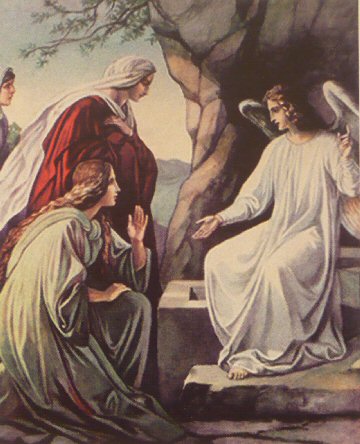 When the Sabbath was over, Mary Magdalene, Mary, the mother of James, and
Salome bought spices so that they might go and anoint him. Very early when
the sun had risen, on the first day of the week, they came to the tomb.
They
When the Sabbath was over, Mary Magdalene, Mary, the mother of James, and
Salome bought spices so that they might go and anoint him. Very early when
the sun had risen, on the first day of the week, they came to the tomb.
They
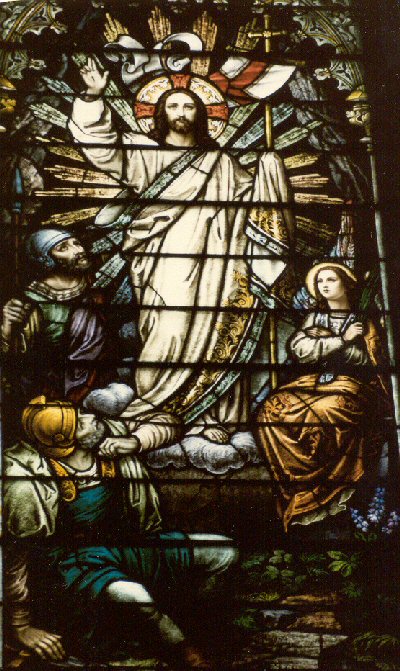 were saying to one another, "Who will roll back the stone for us from the
entrance to the tomb?" When they looked up, they saw that the stone had
been rolled back; it was very large. On entering the tomb they saw a young
man sitting on the right side, clothed in a white robe, and they were utterly
amazed. He said to them, "Do not be amazed! You seek Jesus of
Nazareth, the crucified. He has been raised; he is not here. Behold,
the place where they laid him. But go and tell his disciples and Peter,
'He is going before you to Galilee; there you will see him, as he told you.'"
Then they went out and fled from the tomb, seized with trembling and
bewilderment. They said nothing to anyone, for they were afraid.
(Mark 16:1-8)
were saying to one another, "Who will roll back the stone for us from the
entrance to the tomb?" When they looked up, they saw that the stone had
been rolled back; it was very large. On entering the tomb they saw a young
man sitting on the right side, clothed in a white robe, and they were utterly
amazed. He said to them, "Do not be amazed! You seek Jesus of
Nazareth, the crucified. He has been raised; he is not here. Behold,
the place where they laid him. But go and tell his disciples and Peter,
'He is going before you to Galilee; there you will see him, as he told you.'"
Then they went out and fled from the tomb, seized with trembling and
bewilderment. They said nothing to anyone, for they were afraid.
(Mark 16:1-8)
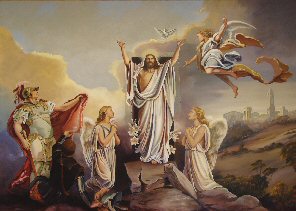 But at daybreak on the first day of the week they took the spices they
had prepared and went to tomb. They found the stone rolled away from the
tomb; but when they entered, they did not find the body of the Lord Jesus.
While they were puzzling over this, behold, two men in dazzling garments
appeared to them. They were terrified and bowed their faces to the ground.
They said to them, "Why do you seek the living one among the dead? He is
not here, but he has been raised. Remember what he said to you while he
was still in Galilee. that the Son of Man must be handed over to sinners
and be crucified, and rise on the third day." (Luke 24:1-7)
But at daybreak on the first day of the week they took the spices they
had prepared and went to tomb. They found the stone rolled away from the
tomb; but when they entered, they did not find the body of the Lord Jesus.
While they were puzzling over this, behold, two men in dazzling garments
appeared to them. They were terrified and bowed their faces to the ground.
They said to them, "Why do you seek the living one among the dead? He is
not here, but he has been raised. Remember what he said to you while he
was still in Galilee. that the Son of Man must be handed over to sinners
and be crucified, and rise on the third day." (Luke 24:1-7)
Top
Index
IV Jesus
gathered an Inner Circle.
Explained his teaching to the Apostles
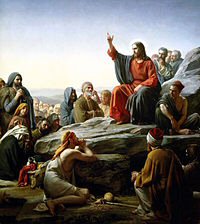 This is
why I speak to them in parables, because 'they look but do not see and hear but
do not listen or understand.' (Mt 13:13)
This is
why I speak to them in parables, because 'they look but do not see and hear but
do not listen or understand.' (Mt 13:13)
"But
blessed are your eyes, because they see, and your ears, because they hear.
Amen, I say to you, many prophets and righteous people longed to see what you
see but did not see it, and to hear what you hear but did not hear it."
(Mt 13:16-17)
V He told them
to teach all nations.
He said to
them, "Go into the whole world and proclaim the gospel to every creature.
Whoever believes and is baptized will be saved; whoever does not believe will be
condemned. (Mark 16:15-16)
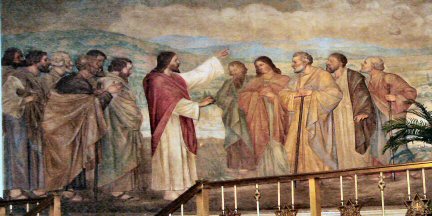 He sent out His
apostles not as the head of an earthly principality but as the sovereign ruler
of the universe. They were to preach the good news of His Gospel to
Gentile nations, as the prophets had foretold. The Church they were
establishing should embrace the entire world and continue to the end of time.
The world was not destined to remain pagan, it was to be transformed in Christ.
He sent out His
apostles not as the head of an earthly principality but as the sovereign ruler
of the universe. They were to preach the good news of His Gospel to
Gentile nations, as the prophets had foretold. The Church they were
establishing should embrace the entire world and continue to the end of time.
The world was not destined to remain pagan, it was to be transformed in Christ.
VI They
would receive the Holy Spirit who would guide the Church until the end of time.
Top
Index
The Ascension
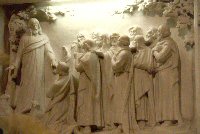 Then
Jesus approached and said to them, "All power in heaven and on earth has been
given to me. Go, therefore, and make disciples of all nations, baptizing
them in the name of the Father, and of the Son, and of the Holy Spirit, teaching
them to observe all that I have commanded you. And behold, I am with you
always, until the end of the age.
(Matthew 28:18-20)
Then
Jesus approached and said to them, "All power in heaven and on earth has been
given to me. Go, therefore, and make disciples of all nations, baptizing
them in the name of the Father, and of the Son, and of the Holy Spirit, teaching
them to observe all that I have commanded you. And behold, I am with you
always, until the end of the age.
(Matthew 28:18-20)
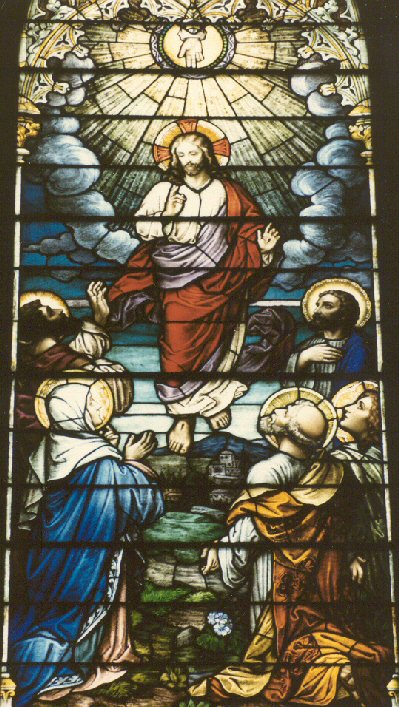 Then he led them as far as Bethany, raised his hands, and blessed them.
As he blessed them he parted from
them and was taken up to heaven.
They did him homage and then returned to Jerusalem with great joy, and
they were continually in the temple praising God.
(Luke 24:50-53)
Then he led them as far as Bethany, raised his hands, and blessed them.
As he blessed them he parted from
them and was taken up to heaven.
They did him homage and then returned to Jerusalem with great joy, and
they were continually in the temple praising God.
(Luke 24:50-53)
So then the Lord Jesus, after he spoke to
them, was taken up into heaven and took his seat at the right hand of God.
(Mark 16:19)
Then Jesus approached and said to them,
"All power in heaven and on earth has been given to me. Go, therefore, and
make disciples of all nations, baptizing them in the name of the Father, and of
the Son, and of the holy Spirit, teaching them to observe all that I have
commanded you. And behold, I am with you always, until the end of the
age." (Matthew 28:18-19)
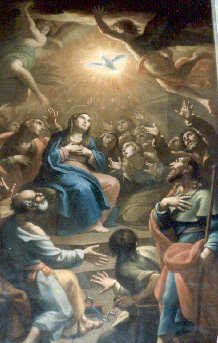 But when he comes, the Spirit of truth,
he will guide you to all truth. He will not speak on his own, but he will
speak what he hears, and will declare to you the things that are coming.
He will glorify me, because he will take from what is mine and declare it to
you. Everything that the Father has is mine; for this reason I told you
that he will take from what is mine and declare it to you. (John
16:13-15)
But when he comes, the Spirit of truth,
he will guide you to all truth. He will not speak on his own, but he will
speak what he hears, and will declare to you the things that are coming.
He will glorify me, because he will take from what is mine and declare it to
you. Everything that the Father has is mine; for this reason I told you
that he will take from what is mine and declare it to you. (John
16:13-15)
"Go, therefore, and make disciples of all
nations, baptizing them in the name of the Father, and of the Son, and of the
holy Spirit, teaching them to observe all that I have commanded you. And
behold, I am with you always, until the end of the age." (Matthew 28:20)
Nevertheless,
the kingdom of God heralded by the prophets, founded by Jesus and proclaimed by
His apostles does not immediately bestow the beatitude of heaven. During
the first centuries thousands offered their blood in testimony to their faith in
Christ and His Gospel. Down to this very day Jesus is preached as the
Crucified, and men accept and obey the despised and persecuted Son of God.
Opposition to God continues, as once upon the mount where Jesus was tempted.
Bread, fame, and power are promised Christians if they but fall down and adore.
Princes and people continue to rise against God and against His Anointed.
Again and again it appears as if victory was theirs. But Christ remains
King of the world. He shatters His foes as a potter's vessel.
Why do the nations protest and the peoples grumble in vain? Kings
on earth rise up and princes plot together against the Lord and his anointed:
"Let us break their shackles and cast off their chains!" The one enthroned
in heaven laughs; the Lord derides them, then speaks to them in anger, terrifies
them in wrath: "I myself have installed my king on Zion, my holy mountain."
I will proclaim the decree of the Lord, who said to me, "You are my son; today I
am your father. Only ask it of me, and I will make your inheritance the
nations, your possession the ends of the earth. With an iron rod you shall
shepherd them, like a clay pot you will shatter them." And now, kings,
give heed; take warning, rulers on earth. Serve the Lord with fear; with
trembling bow down in homage, lest God be angry and you perish from the way in a
sudden blaze of anger. Happy are all who take refuge in God!
(Psalm 2)

And then the sign of the Son of Man will appear in heaven, and all the
tribes of the earth will mourn, and they will see the Son of Man coming upon the
clouds of heaven with power and great glory.
(Matthew 24:30)
Top
Index
 Jesus did not come to
rule over a kingdom in any earthly-political sense; His mission was to conquer
sin and Satan, and this end He could achieve only by suffering and dying.
Much education was needed before the apostles grasped this. However, after
the resurrection of their Master and the descent of the Holy Spirit, they stood
up fearlessly and preached Christ crucified. They withstood the temple
officials who forbade them to teach.
Jesus did not come to
rule over a kingdom in any earthly-political sense; His mission was to conquer
sin and Satan, and this end He could achieve only by suffering and dying.
Much education was needed before the apostles grasped this. However, after
the resurrection of their Master and the descent of the Holy Spirit, they stood
up fearlessly and preached Christ crucified. They withstood the temple
officials who forbade them to teach.  But Jesus remained silent. The high priest then said to
him: “I order you to tell us under oath before the living God whether you are
the Messiah, the Son of God.” Jesus answered: “It is you who say it. But I
tell you this: Soon you will see the Son of Man seated at the right hand of the
Power and coming on the clouds of heaven.” “At this the high priest tore his
robes: “He has blasphemed! What further need have we of witnesses? Remember,
you heard the blasphemy. What is your verdict?” They answered, “He deserves
death!”
(Matthew 26:63-66)
But Jesus remained silent. The high priest then said to
him: “I order you to tell us under oath before the living God whether you are
the Messiah, the Son of God.” Jesus answered: “It is you who say it. But I
tell you this: Soon you will see the Son of Man seated at the right hand of the
Power and coming on the clouds of heaven.” “At this the high priest tore his
robes: “He has blasphemed! What further need have we of witnesses? Remember,
you heard the blasphemy. What is your verdict?” They answered, “He deserves
death!”
(Matthew 26:63-66) But Jesus remained silent; he made no reply. Once again
the high priest interrogated him: “Are you the Messiah, the Son of the Blessed
One?” Then Jesus answered: “I am; and you will see the Son of Man seated at the
right hand of the Power and coming with the clouds of heaven.” At that the high
priest tore his robes and said: “What further need do we have of witnesses? You
have heard the blasphemy. What is your verdict?” They all concurred in the
verdict. “Guilty,” with its sentence of death.
(Mark 4:61-64)
But Jesus remained silent; he made no reply. Once again
the high priest interrogated him: “Are you the Messiah, the Son of the Blessed
One?” Then Jesus answered: “I am; and you will see the Son of Man seated at the
right hand of the Power and coming with the clouds of heaven.” At that the high
priest tore his robes and said: “What further need do we have of witnesses? You
have heard the blasphemy. What is your verdict?” They all concurred in the
verdict. “Guilty,” with its sentence of death.
(Mark 4:61-64) Pilate went back into the praetorium
and summoned Jesus. “Are you the King of the Jews?” he asked him.
Jesus answered, “Are you saying this on your own, or have others been telling
you about me?” I am no Jew!” Pilate retorted, “It is your own people
and the chief priests who have handed you over to me. What have you done?”
Jesus answered; “My kingdom does not belong to this world. If my kingdom
were of this world, my subjects would be fighting to save me from being handed
over to the Jews. As it is, my kingdom is not here.” At this Pilate
said to him, “So, then, you are a king?” Jesus replied: “It is you who say
I am a king. The reason I was born, the reason why I came into the world,
is to testify to the truth. Anyone committed to the truth hears my voice.”
(John 18:33-37)
Pilate went back into the praetorium
and summoned Jesus. “Are you the King of the Jews?” he asked him.
Jesus answered, “Are you saying this on your own, or have others been telling
you about me?” I am no Jew!” Pilate retorted, “It is your own people
and the chief priests who have handed you over to me. What have you done?”
Jesus answered; “My kingdom does not belong to this world. If my kingdom
were of this world, my subjects would be fighting to save me from being handed
over to the Jews. As it is, my kingdom is not here.” At this Pilate
said to him, “So, then, you are a king?” Jesus replied: “It is you who say
I am a king. The reason I was born, the reason why I came into the world,
is to testify to the truth. Anyone committed to the truth hears my voice.”
(John 18:33-37) So Jesus, perturbed again, came to the tomb. It was a cave, and a stone
lay across it. Jesus said, "Take away the stone." Martha, the dead
man's sister, said to him, "Lord, by now there will be a stench; be has been
dead for four days." Jesus said to her, "Did I not tell you that if you
believe you will see the glory of God?" So they took away the stone.
And Jesus raised his eyes and said, "Father, I thank you for hearing me.
I know that you always hear me; but because of the crowd here I have said this,
that they may believe that you sent me." And when he had said this, he
cried out in a aloud voice, "Lazarus, come out!" The dead man came out,
tied hand and foot with burial bands, and his face was wrapped in a cloth.
So Jesus said to them, "Untie him and let him go." (John 11:38-44)
So Jesus, perturbed again, came to the tomb. It was a cave, and a stone
lay across it. Jesus said, "Take away the stone." Martha, the dead
man's sister, said to him, "Lord, by now there will be a stench; be has been
dead for four days." Jesus said to her, "Did I not tell you that if you
believe you will see the glory of God?" So they took away the stone.
And Jesus raised his eyes and said, "Father, I thank you for hearing me.
I know that you always hear me; but because of the crowd here I have said this,
that they may believe that you sent me." And when he had said this, he
cried out in a aloud voice, "Lazarus, come out!" The dead man came out,
tied hand and foot with burial bands, and his face was wrapped in a cloth.
So Jesus said to them, "Untie him and let him go." (John 11:38-44)
 Before Jesus had finished speaking to them, a synagogue leader came up, did him
reverence, and said: “My daughter has just died. Please come and lay your hand
on her and she will come back to life.”
Before Jesus had finished speaking to them, a synagogue leader came up, did him
reverence, and said: “My daughter has just died. Please come and lay your hand
on her and she will come back to life.”  They
came to Jericho. And as he was leaving Jericho with his disciples and a
sizable crowd, Bartimaeus, a blind man, the son of Timaeus, sat by the roadside
begging. On hearing that it was Jesus of Nazareth, he began to cry out and
say, "Jesus, son of David, have pity on me. And many rebuked him, telling
him to be silent. But he kept calling out all the more, "Son of David,
have pity on me." Jesus stopped and said, "Call him." So they called
the blind man, saying to him, "Take courage; get up, he is calling you."
He threw aside his cloak, sprang up, and came to Jesus. Jesus said to him
in reply, "What do you want me to do for you?" The blind man replied to
him, "Master, I want to see." Jesus told him, "Go your way, your faith has
saved you." Immediately he received his sight and followed him on the way.
(Mark 10:46-52)
They
came to Jericho. And as he was leaving Jericho with his disciples and a
sizable crowd, Bartimaeus, a blind man, the son of Timaeus, sat by the roadside
begging. On hearing that it was Jesus of Nazareth, he began to cry out and
say, "Jesus, son of David, have pity on me. And many rebuked him, telling
him to be silent. But he kept calling out all the more, "Son of David,
have pity on me." Jesus stopped and said, "Call him." So they called
the blind man, saying to him, "Take courage; get up, he is calling you."
He threw aside his cloak, sprang up, and came to Jesus. Jesus said to him
in reply, "What do you want me to do for you?" The blind man replied to
him, "Master, I want to see." Jesus told him, "Go your way, your faith has
saved you." Immediately he received his sight and followed him on the way.
(Mark 10:46-52) Soon
afterward he journeyed to a city called Nain, and his disciples and a large
crowd accompanied him. As he drew near to the gate of the city, a man who
had died was being carried out, the only son of his mother, and she was a widow.
A large crowd from the city was with her. when the Lord saw her, he was
moved with pity for her and said to her, "Do not weep." He stepped forward
and touched the coffin, at this the bearers halted, and he said, "Young man, I
tell you arise!" The dead man sat up and began to speak, and Jesus gave
him to his mother. Fear seized them all, and they glorified God,
exclaiming, "A great prophet has arisen in our midst," and "God has visited his
people." This report about him spread through the whole of Judea and in
all the surrounding region.
Soon
afterward he journeyed to a city called Nain, and his disciples and a large
crowd accompanied him. As he drew near to the gate of the city, a man who
had died was being carried out, the only son of his mother, and she was a widow.
A large crowd from the city was with her. when the Lord saw her, he was
moved with pity for her and said to her, "Do not weep." He stepped forward
and touched the coffin, at this the bearers halted, and he said, "Young man, I
tell you arise!" The dead man sat up and began to speak, and Jesus gave
him to his mother. Fear seized them all, and they glorified God,
exclaiming, "A great prophet has arisen in our midst," and "God has visited his
people." This report about him spread through the whole of Judea and in
all the surrounding region.
 After the Sabbath, as the first
day of the week was dawning, Mary Magdalene and the other Mary came to see the
tomb. And behold, there was a great earthquake; for an angel of the Lord
descended from heaven, approached, rolled back the stone, and sat upon it.
His appearance was like lightning and his clothing was white as snow. The
guards were shaken with fear of him and became like dead men. Then the
angel said to the women in reply, "Do not be afraid! I know that you are
seeking Jesus the crucified. He is not here, for he has been raised just
as he said. Come and see the place where he lay. Then go quickly and
tell his disciples, 'He has been raised from the dead, and he is going before
you to Galilee; there you will see him.' Behold, I have told you."
Then they went away quickly from the tomb, fearful yet overjoyed, and ran to
announce this to his disciples. And behold, Jesus met them on their way and
greeted them. They approached, embraced his feet, and did him homage.
Then Jesus said to them, "Do not be afraid. Go tell my brothers to go to
Galilee, and there they will see me." (Matthew 28:1-10)
After the Sabbath, as the first
day of the week was dawning, Mary Magdalene and the other Mary came to see the
tomb. And behold, there was a great earthquake; for an angel of the Lord
descended from heaven, approached, rolled back the stone, and sat upon it.
His appearance was like lightning and his clothing was white as snow. The
guards were shaken with fear of him and became like dead men. Then the
angel said to the women in reply, "Do not be afraid! I know that you are
seeking Jesus the crucified. He is not here, for he has been raised just
as he said. Come and see the place where he lay. Then go quickly and
tell his disciples, 'He has been raised from the dead, and he is going before
you to Galilee; there you will see him.' Behold, I have told you."
Then they went away quickly from the tomb, fearful yet overjoyed, and ran to
announce this to his disciples. And behold, Jesus met them on their way and
greeted them. They approached, embraced his feet, and did him homage.
Then Jesus said to them, "Do not be afraid. Go tell my brothers to go to
Galilee, and there they will see me." (Matthew 28:1-10) When the Sabbath was over, Mary Magdalene, Mary, the mother of James, and
Salome bought spices so that they might go and anoint him. Very early when
the sun had risen, on the first day of the week, they came to the tomb.
They
When the Sabbath was over, Mary Magdalene, Mary, the mother of James, and
Salome bought spices so that they might go and anoint him. Very early when
the sun had risen, on the first day of the week, they came to the tomb.
They
 were saying to one another, "Who will roll back the stone for us from the
entrance to the tomb?" When they looked up, they saw that the stone had
been rolled back; it was very large. On entering the tomb they saw a young
man sitting on the right side, clothed in a white robe, and they were utterly
amazed. He said to them, "Do not be amazed! You seek Jesus of
Nazareth, the crucified. He has been raised; he is not here. Behold,
the place where they laid him. But go and tell his disciples and Peter,
'He is going before you to Galilee; there you will see him, as he told you.'"
Then they went out and fled from the tomb, seized with trembling and
bewilderment. They said nothing to anyone, for they were afraid.
(Mark 16:1-8)
were saying to one another, "Who will roll back the stone for us from the
entrance to the tomb?" When they looked up, they saw that the stone had
been rolled back; it was very large. On entering the tomb they saw a young
man sitting on the right side, clothed in a white robe, and they were utterly
amazed. He said to them, "Do not be amazed! You seek Jesus of
Nazareth, the crucified. He has been raised; he is not here. Behold,
the place where they laid him. But go and tell his disciples and Peter,
'He is going before you to Galilee; there you will see him, as he told you.'"
Then they went out and fled from the tomb, seized with trembling and
bewilderment. They said nothing to anyone, for they were afraid.
(Mark 16:1-8) But at daybreak on the first day of the week they took the spices they
had prepared and went to tomb. They found the stone rolled away from the
tomb; but when they entered, they did not find the body of the Lord Jesus.
While they were puzzling over this, behold, two men in dazzling garments
appeared to them. They were terrified and bowed their faces to the ground.
They said to them, "Why do you seek the living one among the dead? He is
not here, but he has been raised. Remember what he said to you while he
was still in Galilee. that the Son of Man must be handed over to sinners
and be crucified, and rise on the third day." (Luke 24:1-7)
But at daybreak on the first day of the week they took the spices they
had prepared and went to tomb. They found the stone rolled away from the
tomb; but when they entered, they did not find the body of the Lord Jesus.
While they were puzzling over this, behold, two men in dazzling garments
appeared to them. They were terrified and bowed their faces to the ground.
They said to them, "Why do you seek the living one among the dead? He is
not here, but he has been raised. Remember what he said to you while he
was still in Galilee. that the Son of Man must be handed over to sinners
and be crucified, and rise on the third day." (Luke 24:1-7) This is
why I speak to them in parables, because 'they look but do not see and hear but
do not listen or understand.' (Mt 13:13)
This is
why I speak to them in parables, because 'they look but do not see and hear but
do not listen or understand.' (Mt 13:13)  He sent out His
apostles not as the head of an earthly principality but as the sovereign ruler
of the universe. They were to preach the good news of His Gospel to
Gentile nations, as the prophets had foretold. The Church they were
establishing should embrace the entire world and continue to the end of time.
The world was not destined to remain pagan, it was to be transformed in Christ.
He sent out His
apostles not as the head of an earthly principality but as the sovereign ruler
of the universe. They were to preach the good news of His Gospel to
Gentile nations, as the prophets had foretold. The Church they were
establishing should embrace the entire world and continue to the end of time.
The world was not destined to remain pagan, it was to be transformed in Christ. Then
Jesus approached and said to them, "All power in heaven and on earth has been
given to me. Go, therefore, and make disciples of all nations, baptizing
them in the name of the Father, and of the Son, and of the Holy Spirit, teaching
them to observe all that I have commanded you. And behold, I am with you
always, until the end of the age.
(Matthew 28:18-20)
Then
Jesus approached and said to them, "All power in heaven and on earth has been
given to me. Go, therefore, and make disciples of all nations, baptizing
them in the name of the Father, and of the Son, and of the Holy Spirit, teaching
them to observe all that I have commanded you. And behold, I am with you
always, until the end of the age.
(Matthew 28:18-20) Then he led them as far as Bethany, raised his hands, and blessed them.
As he blessed them he parted from
them and was taken up to heaven.
They did him homage and then returned to Jerusalem with great joy, and
they were continually in the temple praising God.
(Luke 24:50-53)
Then he led them as far as Bethany, raised his hands, and blessed them.
As he blessed them he parted from
them and was taken up to heaven.
They did him homage and then returned to Jerusalem with great joy, and
they were continually in the temple praising God.
(Luke 24:50-53) But when he comes, the Spirit of truth,
he will guide you to all truth. He will not speak on his own, but he will
speak what he hears, and will declare to you the things that are coming.
He will glorify me, because he will take from what is mine and declare it to
you. Everything that the Father has is mine; for this reason I told you
that he will take from what is mine and declare it to you. (John
16:13-15)
But when he comes, the Spirit of truth,
he will guide you to all truth. He will not speak on his own, but he will
speak what he hears, and will declare to you the things that are coming.
He will glorify me, because he will take from what is mine and declare it to
you. Everything that the Father has is mine; for this reason I told you
that he will take from what is mine and declare it to you. (John
16:13-15)